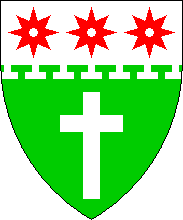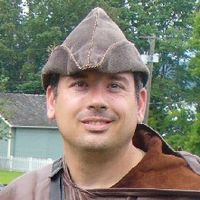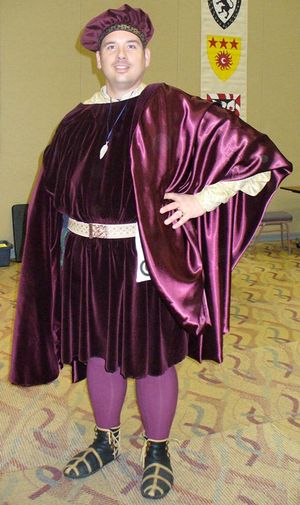Michael FitzGeoffrey: Difference between revisions
Fitzgeoffrey (talk | contribs) No edit summary |
Fitzgeoffrey (talk | contribs) →Personae: a |
||
| Line 12: | Line 12: | ||
== Personae == | == Personae == | ||
Michael FitzGeoffrey is actually two different personae, but with the same name: | Michael FitzGeoffrey is actually two different personae, but with the same name: | ||
<span style="color: #dd0000">(1)</span> Michael FitzGeoffrey was born 21 February 1170 in Dover, England. At the time he was conceived, his Anglo-Saxon mother was employed as a barmaid at the Inn of the Red Star, an establishment with a reputation for quality among those in the area. In early June 1169, this inn boarded a small party of Norman travelers returning to London, England from Calais, France. The most distinguished guest in this party was none other than the son of King Henry II, Geoffrey, Duc de Bretagne! It was Michael’s mother who caught the prince’s eye and was chosen to keep His Grace’s bed warm during the three nights of His stay. As it turns out, her monthly cycle had concluded but that very morning. His mother took ill just after the departure of her royal patron, causing her to be unable to perform similar services for other clients for a solid fortnight, by which time she had begun to suspect that she was expecting. | |||
Knowing that if she was, indeed, with child that her babe could only be the prince’s offspring, and recognizing the potential for this to become a source of wealth and status for her the likes of which she had never before dreamt of, she fled the inn and sought refuge in a priory where her older sister had recently taken holy orders as a Benedictine nun. She remained at the priory living on the charity of the house until her son was weaned. | |||
At his birth, she had him baptized Michael FitzGeoffrey, naming him Michael after the parish priest, whom she chose for his godfather, and FitzGeoffrey to indicate his father’s identity. Although it was her intention, should the babe turn out to be a boy, to present him before the prince and seek his recognition as a royal bastard, the opportunity never came, and she also had no evidence to support such a claim other than her own word. | |||
Having a parish priest for his godfather, and living in the vicinity of the priory wherein he was born, Michael divided his time between his mother, who took up the art of embroidery during her pregnancy, and eventually married a journeyman armorer employed by the local baron, by whom she had a daughter and a son. Father Michael, taught him his catechism, some Latin, some Anglo-Norman[http://www.anglo-norman.net], some politics, and scribal skills. Michael was equally at home at the priory, among the baron’s servants, and in the village. | |||
From an early age, the colors of armorial display always fascinated him and became a focus of abiding interest. As a lad of 11 to 15 years of age, he came and went throughout the village as a messenger. By the time he was 16 he was regularly working as a village crier. When the calls went abroad recruiting for the Third Crusade, Michael took leave of his mother, stepfather, and godfather, with whose written recommendation he joined the crusade as a herald for the local baron, who also followed King Richard Cœur de Lion to Jerusalem. During the course of the Crusade, he left the service of the baron in order to accept a position as a pursuivant of arms in the service of the King himself, and in that employ, was awarded arms by the king-of-arms that supervised him. | |||
Returning to England, he left his employment in the royal household, and bought himself a small estate using moneys that he had acquired. This estate was in the county town of the county that included the priory where he was born and the village where his mother had lived when the journeyman armorer married her. Michael was subsequently employed as a herald for the Earl, and eventually married one of the Countess’s nieces. | |||
[[image:P1040206.JPG|thumb|right|Lord Michael at Twelfth Night A.S. XLIV (dressed in 14th Century Florentine garb)]] | |||
---- | |||
<span style="color: #dd0000">(2)</span> Lord Michael FitzGeoffrey was born on Michaelmas (29 September) of 1350. He was the third son of an English earl. He married Lady Avelyn de Mowbray, a kinswoman of the Duke of Norfolk. | |||
Lord Michael had from time to time served at court and had attended a few parliaments as a member of the House of Commons (seeing that his honorific is merely a courtesy title, derived from his being an earl’s son, but not heir). He came to be regarded as a capable administrator in the variety of offices to which he was posted, and more particularly as an officer-of-arms. | |||
He often occupied his free time with various pursuits, at which he demonstrated a potential for talent, yet rarely with sufficient practice to become renowned, the chief exception to this being his work with the crafting of mail armor. | |||
== Household == | |||
Lord Michael and his family are in a [[household]] with: the family of Lady [[Elewys Cuylter of Finchingefeld]], [[Martha at Gore]], and the family of [[Elizabeth of Fernhill]]. The household currently doesn’t have a name, but they called themselves ''House Finchingefeld'' at September Crown 2012 to reserve group camping. | |||
Revision as of 10:39, 14 October 2012
Full Name and Style: Lord Michael FitzGeoffrey, GdS, OLM, Midhaven Pursuivant

Arms: Vert, a Latin cross and on a chief potenty argent, three mullets of eight points pierced gules.
Email: michaelfitzgeoffrey@gmail.com[1]
Blog: http://www.michaelfitzgeoffrey.blogspot.com/

Personae
Michael FitzGeoffrey is actually two different personae, but with the same name:
(1) Michael FitzGeoffrey was born 21 February 1170 in Dover, England. At the time he was conceived, his Anglo-Saxon mother was employed as a barmaid at the Inn of the Red Star, an establishment with a reputation for quality among those in the area. In early June 1169, this inn boarded a small party of Norman travelers returning to London, England from Calais, France. The most distinguished guest in this party was none other than the son of King Henry II, Geoffrey, Duc de Bretagne! It was Michael’s mother who caught the prince’s eye and was chosen to keep His Grace’s bed warm during the three nights of His stay. As it turns out, her monthly cycle had concluded but that very morning. His mother took ill just after the departure of her royal patron, causing her to be unable to perform similar services for other clients for a solid fortnight, by which time she had begun to suspect that she was expecting.
Knowing that if she was, indeed, with child that her babe could only be the prince’s offspring, and recognizing the potential for this to become a source of wealth and status for her the likes of which she had never before dreamt of, she fled the inn and sought refuge in a priory where her older sister had recently taken holy orders as a Benedictine nun. She remained at the priory living on the charity of the house until her son was weaned.
At his birth, she had him baptized Michael FitzGeoffrey, naming him Michael after the parish priest, whom she chose for his godfather, and FitzGeoffrey to indicate his father’s identity. Although it was her intention, should the babe turn out to be a boy, to present him before the prince and seek his recognition as a royal bastard, the opportunity never came, and she also had no evidence to support such a claim other than her own word.
Having a parish priest for his godfather, and living in the vicinity of the priory wherein he was born, Michael divided his time between his mother, who took up the art of embroidery during her pregnancy, and eventually married a journeyman armorer employed by the local baron, by whom she had a daughter and a son. Father Michael, taught him his catechism, some Latin, some Anglo-Norman[2], some politics, and scribal skills. Michael was equally at home at the priory, among the baron’s servants, and in the village.
From an early age, the colors of armorial display always fascinated him and became a focus of abiding interest. As a lad of 11 to 15 years of age, he came and went throughout the village as a messenger. By the time he was 16 he was regularly working as a village crier. When the calls went abroad recruiting for the Third Crusade, Michael took leave of his mother, stepfather, and godfather, with whose written recommendation he joined the crusade as a herald for the local baron, who also followed King Richard Cœur de Lion to Jerusalem. During the course of the Crusade, he left the service of the baron in order to accept a position as a pursuivant of arms in the service of the King himself, and in that employ, was awarded arms by the king-of-arms that supervised him.
Returning to England, he left his employment in the royal household, and bought himself a small estate using moneys that he had acquired. This estate was in the county town of the county that included the priory where he was born and the village where his mother had lived when the journeyman armorer married her. Michael was subsequently employed as a herald for the Earl, and eventually married one of the Countess’s nieces.

(2) Lord Michael FitzGeoffrey was born on Michaelmas (29 September) of 1350. He was the third son of an English earl. He married Lady Avelyn de Mowbray, a kinswoman of the Duke of Norfolk.
Lord Michael had from time to time served at court and had attended a few parliaments as a member of the House of Commons (seeing that his honorific is merely a courtesy title, derived from his being an earl’s son, but not heir). He came to be regarded as a capable administrator in the variety of offices to which he was posted, and more particularly as an officer-of-arms.
He often occupied his free time with various pursuits, at which he demonstrated a potential for talent, yet rarely with sufficient practice to become renowned, the chief exception to this being his work with the crafting of mail armor.
Household
Lord Michael and his family are in a household with: the family of Lady Elewys Cuylter of Finchingefeld, Martha at Gore, and the family of Elizabeth of Fernhill. The household currently doesn’t have a name, but they called themselves House Finchingefeld at September Crown 2012 to reserve group camping.